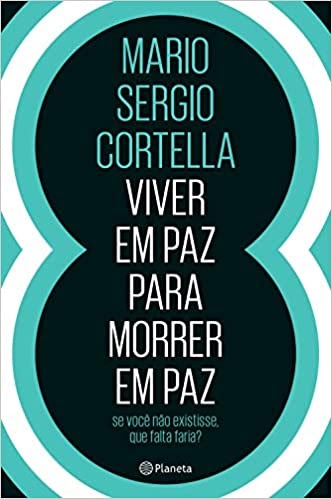
Viver em Paz Para Morrer em Paz - Mário Sergio Cortella
“If you didn't exist, would you be missed?” It is with this question that Mário Sergio Cortella invites the reader to reflect about the reasons for existence.
Add to Favorites
Add to read
Mark as read
Who has never wondered, "Am I on the right track?" In "Viver em Paz Para Morrer em Paz" Mario Sergio Cortella presents a series of reflections in a book that brings together chronicles of simple reading, but with transformative potential.
With each chronicle, through accounts of his own life, quotes from thinkers and philosophers, the author invites the readers to reflect on what defines the importance of people and things.
In addition, the author also provides insights for us to find the true north of our lives based on the meaning in other people's lives.
Want to know more? So, keep reading this summary where we show the most important aspects of the book.
About the book "Viver em Paz Para Morrer em Paz"
The book "Viver em Paz para Morrer em Paz" has 19 chapters and 176 pages of simple language, albeit with philosophical themes.
Mario Sergio Cortella has built a work that is, at the same time, rich in linguistic references and brings to debate the main themes of contemporary society, such as consumerism and the pursuit of success.
About the author Mário Sérgio Cortella
Mario Sergio Cortella is a philosopher and writer, master and a doctor in education and a full professor at PUC-SP, teaching and research about education in the Post-graduation program.
Cortella is also the author of more than thirty other books, including:
- "Lucky Follows Courage!" "A Sorte Segue a Coragem";
- "The Best of Cortella" "O Melhor do Cortella";
- "Why do We Do What We Do?" "Por que Fazemos o que Fazemos?";
- "What's your Masterpiece" "Qual é a tua Obra?".
Cortella is also on YouTube, where his teachings are shared with over five hundred and thirty-six thousand subscribers. And you can be one of them!
To whom is this book indicated?
The book is indicated for those who are looking for well-being and quality of life.
The work is also suitable for those who seek for success and self-realization, and for you who want to think about the dilemmas and reflections of everyday themes from a philosophical perspective.
Main ideas of the book "Viver em Paz Para Morrer em Paz"
- What is learned from the obvious;
- Write, to appease;
- The difference is in attitude;
- Missing and nostalgia, roots and anchors;
- Experience and unforeseen events;
- The acceptance of disagreement;
- The ray of passion and the construction of love;
- Live in peace;
- Ecology, attachment, and eroticism;
- The grace of life;
- The society of the exhibition;
- How I became myself;
- The creation of differentials;
- Manufacturing of the past, yearning for the future and despair of consumption;
- Evolution is not always for the better;
- Sex, the simple and the complex;
- Happiness as vitality;
- Desire, need, will;
- Reasons for existence.
In this summary, we will present the three main questions that the author poses: "If you didn't exist, what would you do?", "The difference is in attitude" and "Reasons of existence."
So, let's go!
Download the "Viver em Paz Para Morrer em Paz" Book Summary in PDF for free
Do you have no time to read now? Then download the free PDF and read wherever and whenever you want:
Overview: If you didn't exist, people would miss you?
The author begins the book talking about the circumstances surrounding the conception of another book, "What Life Taught Me," which composed a collection launched by Editora Saraiva, in partnership with Versar.
According to Cortella, after accepting the challenge from the journalist Luis Columbini in 2009, he focused for a few days on what would be the conducting track for the book.
At that moment, he remembered a question that had been with him since he was a child: "If you didn't exist, people would miss you?"
Since then, the issue has followed Cortella, and this is precisely the main question of the book.
Cortella soon points that living in peace is living in a warm way. Thus, in the author's view, the question goes beyond the consumerist obsession, which states that "we are what we have."
Being important, according to the philosopher, is different from being famous. Thi way, there are people who are important but not famous and others who are famous but not important.
The key to the matter is that the important person is the one who is needed.
In this, Cortella advises to do not be the property of your own properties.
So, in simple words, Cortella makes us wonder if we are really important to the people around us in our professional and personal lives and if our absence really will be missed.
Overview: The difference is in attitude
In part of the book "Viver em Paz Para Morrer em Paz", Cortella starts from an everyday example: the routine of all-day working parents returning home - and to their children - only late at night.
Such routine makes it impossible to fully monitor the lives of your children, as well as their school performance. Thus, the author talks about how most parents just "take a look" at their children's lessons without really concerning about it.
From this scenario, the philosopher tells us that just to look is supervising, and in that there's a huge difference because who supervises the guests, does not watch them.
From there, Cortella leads us to reflect on the way we observe and relate to "the other" in our daily lives, not only in the family environment but also in the corporate environment.
Still, with a domestic example of daily life, Cortella reflects on the "second providence" that fathers and mothers generally make to their children.
According to the author, it is common for parents to ask their children, "So, son, what did you learn today?" when, in fact, it would be smarter to ask, "Hey boy, what can you teach me today?"
According to the philosopher himself, the answer to both questions may be the same, but the difference is in attitude.
What did the author mean by this? Going beyond the family sphere, we realize that teaching also guides us on how to improve performance in our work.
So the "provocation" left to the readers is: "Which of the two things have you been doing?"; and the second: "Wouldn't it be smarter and more motivating to ask your followers the second kind of question instead of the first?"
Cortella himself goes on throughout this chronicle telling that many of us complain that "the other" is not open to dialogue when, in fact, we do little or nothing to create a "bridge". And without a bridge, each individual becomes an island.
Thus, Cortella leads us to the main point of this chapter, that is, everyone loves to teach.
So, when you want to know something about someone, it is not smart, to do an inquiry or a direct interrogation. It makes the other feel pressured and not willing to answer, that means, to teach you about that.
So, the author goes on, highlighting that no one is just a leader, but is also guided by one.
Overview: Reasons for existence
Near to the end of the book "Viver em Paz Para Morrer em Paz", Mario Sergio Cortella introduces the reader to his concept of knowing the importance of things, which he always shares in his lectures and classes.
He exemplifies the case of a student, who asked him about the importance of physical education in the elementary school curriculum.
In these situations, the philosopher advises you to think yourself if that thing didn't exist, would you matter about.
In this case, the author goes on, returning to the initial question: "If I didn't exist, would I be missed?". The philosopher believes that these answers establish the reasons for existence, as well as the "snags" of existence.
The author goes on sharing one of his habits.
On the first day of the year, in a physical and symbolic gesture, he makes two columns on a blank paper, where he writes on one side "Despite" and on the other "Because of".
From there, he chooses the main themes of the past year and begins to think about them.
According to Cortella, if the "Despite" column has more items (that is if the "snags" exceed the "reasons"), something in your life needs to be seriously rethought.
On the other hand, when "reasons" are superior to "snags", it is a sign that you are on the right track.
This is because, after all, what is worth in life are the reasons to live, to think and to act.
So Cortella concludes, that living in peace is not to live without problems, but live with the clarity of doing what needs to be done.
At the end of countless reflections, the author returns to the initial motto for the reader's reflection: "If I did not exist, people would miss me?".
What do other authors say about it?
For Marcus Buckingham and Donald Clifton, authors of "Now, Discover Your Strengths", to increase a company productivity, the key is to focus on employees' strengths rather than trying to improve their weaknesses.
In the book "Life-Changing Secrets", there are several lessons about success, which is linked, according to the work, to a personal plan that must be executed using the powers of the human subconscious.
Finally, in the book "Choose Yourself", author James Altucher presents ideas that will make you take control of your life and make decisions that will lead you to success.
Okay, but how can I apply this to my life?
After reflecting on the main aspects of the book "Viver em Paz Para Morrer em Paz", we can bring some teaching to our life, as:
- Do not fool yourself: being important is different from being famous;
- Do not own your property: always show "who is in charge";
- Occasionally ask yourself, "Am I really important to the people around me?";
- Ask yourself: "Will my absence really be missed?";
- When assisting something or someone, remember: looking is not watching but supervising;
- When feeling isolated or left out, do not complain that "the other" is not open to dialogue. Instead, create "a bridge";
- If you are in charge, it is always good to remember: no one is just a leader but also guided by one;
- To know if something is fundamental, ask yourself, "If such a thing did not exist, what would it lack?";
- Don't stress anymore, as Cortella said, what is worth in life are the "reasons" - to live, to think and to act.
Did you like this summary of the book "Viver em Paz Para Morrer em Paz"?
Tell us in the comments what you think of this summary. Your feedback is very important to us.
You can also check out the complete work just clicking on the image below:

![Click and download the PDF! [Book Summary] Viver em Paz Para Morrer em Paz - Mário Sergio Cortella](https://images.prismic.io/pb4y/MDU1MjkwMzEtZWY0MC00YTU1LTlkYWYtMzg3ODA2YTUyZDEy_fkzty4zgvhmdvl_0pikt82sloraxnrswcbhkhi95gj2tieaipv1d6krkdy2ftneeslclmud7ssejc6crxngjq3pmpmm4lbm_kjdiljxmpfdrsvfzo5hfjralmfu-edsf_d0qcjpzbqdqnt-4msgqyoo)
